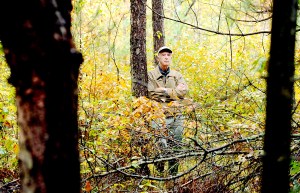Fred Huntress knows as much about growing trees as he does about cutting them down.
The key, said Huntress, is patience. “It takes time to see the results of your work.”
Huntress was born in Auburn and moved to Poland in 1961. “In 79 years, I have gone 12 miles. I don’t travel much.”
He does’nt need to.
Huntress owns land in six towns and knows each piece meticulously. For each of his wooded lots, Huntress keeps a folder with old maps, photographs and color coded bits of information.
He maintains trails for public use on a parcel in Casco, allows hunting with permission, sells standing timber from most of his lots and lives on the seventh and eighth greens of a former 18 hole golf course.
But for the most part, Huntress owns acres of trees.
“I love the woods,” he said.
To be more specific, Huntress enjoys what grows in the woods. “I just enjoy watching trees grow.” The license plate on his green pickup reads “Big Tree.”
Huntress is a retired forester and knows a thing or two about the woods. “Pine trees are slow growers during the first five years. White pine is desired on the market, but has problems with insects. Red pine does not have the market, nor the insects, but easier to grow … they grow straight and tall,” he said.
“I have spent thousands of hours on these lands,” he said.
Like putting a puzzle together, Huntress purchased much of his land, one small piece at a time, before the housing boom hit. “That’s how you get big lots here. You put them together,” he said as he pointed out that not many large tracts of land are left in Southern Maine.
Huntress said it used to be “locals buying local” when it came to the sale of land. Not anymore. “The whole world is your market today with the Internet.”
People from southern New England who like to hunt, look to Maine when they want a place to establish deer camp, Huntress said. He points to a wooded lot on Bragdon Hill in Poland that he once owned. It’s now part of a large conservation project that will never be developed.
“I could have cut all the timber and sold the land to some hunter from Connecticut for a lot more,” Huntress said. “I don’t want to treat land that way.”
Huntress celebrated his 79th birthday at the Fryeburg Fair, Maine’s largest fair that dedicates a day to men and women who work in the woods.
“I love working with loggers,” said Huntress, who sells timber from his lots to support his retirement. “I have probably worked with a couple hundred loggers over the years. “They are hard-working people.”
The patience that Huntress emphasizes is starting to pay off.
“I am now harvesting trees that I grew myself,” he said while checking on a logger cutting a stand of white pine in Poland. “It’s amazing to see trees that you can make saw logs out of that I planted by hand, one tree at a time.”
Huntress keeps a close eye on his his land being cut. He marks the trees and flags the skidder roads. “I have pretty good control over it,” he said. “You try to leave the best trees to grow.”
“Afterall, I’m an old forester who likes to grow trees.”

Comments are no longer available on this story